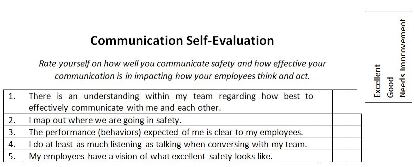Being a Better Safety Communicator
Which box would your employees check for each statement: Excellent? Good? Needs Improvement?
How effectively do you communicate? Communication is one of the most important methods of influence and critical to success in any organization. It is also one of the most difficult to consistently get right. Great orators over time have moved bodies to conquer armies and moved hearts and minds to bring people together during difficult times. Today, captured attention is harder to come by and has become significantly competitive. Everyone has a message, and everyone feels theirs is more important than others'.
In our work helping leaders to understand and strategically prioritize how to improve culture, with the vast majority of them, improving communication is a primary focus of resources.
While organizations must educate, train, and coach their leaders (formal and informal) in communication tactics and help them continuously identify opportunities for further improvement, it is up to the individual leaders to improve themselves. A communication self-evaluation can help. This is a tool used with clients during leadership development and communication improvement engagements.

As you review each item, put yourself in the position of those you are leading. Consider their perspective, and then rate yourself on how effective you would be rated by your employees, based on how your employees think and act. Take the time to give this serious consideration. Which box would they check for each statement: Excellent? Good? Needs Improvement?
Communication Self-Evaluation
- There is an understanding within my team regarding how best to effectively communicate with me and each other.
- I map out where we are going in safety.
- The performance (behaviors) expected of me is clear to my employees.
- I do at least as much listening as talking when conversing with my team.
- My employees have a vision of what excellent safety looks like.
- My employees correctly know what it takes to prevent injuries and enhance our culture.
- I regularly communicate what I expect in safety.
- I do not allow employees to make exceptions to safety requirements or strategy.
- I don't accept excuses for not being safe.
- I don't let up on safety when work demands increase.
- I never criticize, nor am I ever sarcastic about safety.
- My employees don’t feel like they have to hide their regular work practices from me.
- I have told all my employees why safety is personally important to me and why I take it seriously.
- I regularly ask for safety improvement ideas and suggestions.
- I encourage my employees to practice safety off the job.
- I hold my employees accountable more for their performance (how they perform the work) than their results (what they get done).
- I recognize and provide feedback for desired performance (what they do well) just as often as undesired performance (where improvement is needed).
- I seek more to understand influences on risk than give safety advice when seeing concerning or unsafe behaviors.
- When speaking with my employees, I pay attention to their body language and alter my messaging if necessary.
- I invest in myself and seek out feedback and/or tools to improve my communication skills.
Once you have completed the self-assessment outlined above, develop your own improvement plan or seek out resources to help you in your efforts. Consider revisiting this assessment tool at least quarterly and continue questioning how effectively you communicate. To receive a scoresheet to complete this self-evaluation, contact the author at info@proactsafety.com and mention Communication Self-Evaluation Scoresheet.
This article originally appeared in the October 2017 issue of Occupational Health & Safety.
About the Author
Shawn M. Galloway is the president of ProAct Safety and co-author of several best-selling books. As a consultant, advisor, and keynote speaker, he has helped hundreds of organizations within every major industry to improve safety strategy, culture, leadership, and engagement. He is also the host of the acclaimed weekly podcast series Safety Culture Excellence®. He can be reached at 936-273-8700 or info@ProActSafety.com.